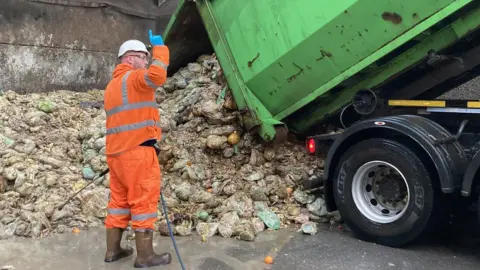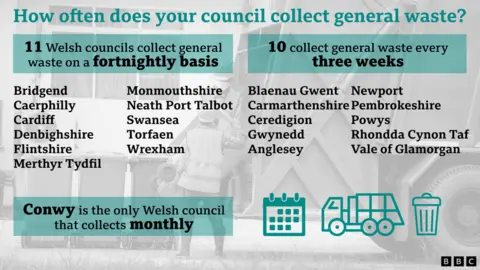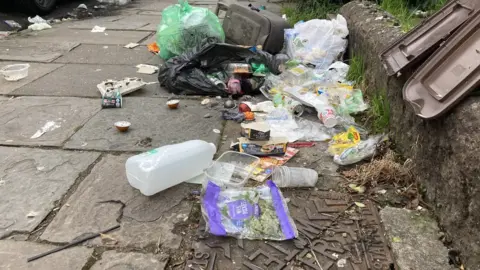Three-week or monthly bin days loom for most Welsh areas
 BBC
BBCMore than half of Welsh councils could cut bin collections to once every three or four weeks as they grapple with financial pressures.
Eleven councils currently collect general waste fortnightly, but factors including recycling targets mean more could move closer to just one a month.
One family told the BBC they already make regular trips to their local tip to manage their build-up of waste.
The body representing Wales' councils said they face a funding gap of £432m.
Out of the country's 22 local authorities, only Conwy council currently collects general waste monthly.
But changes being considered by other councils mean the majority of them could soon offer one waste pickup every three or four weeks.

Steven Rogers, who lives with his wife and four children in Tonyrefail, Rhondda Cynon Taf, said that current collections in his area are not enough "by any stretch".
Nappies are collected every week, alongside recycling bags and food waste, but general waste is collected every three weeks, and the family is limited to three bags each time.
Mr Rogers said despite the family recycling every they can, he has to make trips to the dump to dispose waste.
"We compost everything that we produce in the kitchen," he said, adding that if you miss bin day "you're in trouble because then you've got six weeks of waste piling up".
What's happening where you live?
Councils that are considering changes include:
- Caerphilly council is consulting on plans to move to collections every three or four weeks
- Councillors in Pembrokeshire have recommended a 16.31% increase in council tax which would include a move to bin collections every four weeks
- Cardiff council has proposed collections every three weeks
- Denbighshire council has also previously said it was considering bin collections every four weeks, but has now told BBC told that these plans have been delayed
- Some councils are considering other changes to waste collections, including Ceredigion which has considered proposals that could see nappy collections scrapped completely, and Monmouthshire which is proposing a 10% increase in what it charges for collecting garden waste.
Recycling targets
From April, the Welsh government's recycling targets for local authorities is 70% of all rubbish collected.
Many councils are not hitting that - with Torfaen council the lowest at 59% and Caerphilly council at 61%.
Caerphilly has said it risks fines of £2m if it did not improve its recycling rates.
As part of the move to increase recycling and cut general waste, many councils are pushing food waste recycling.
A recent report for Merthyr Tydfil council found that half of residents recycle their food waste.

The Biogen recycling plant near Aberdare recycles 22,500 tonnes of food waste from households in Newport, Merthyr Tydfil and Rhondda Cynon Taf.
Darren Forster, local authority development manager for Biogen, said that almost a quarter of Wales' residual waste is food.
"Food waste is obviously very heavy - so for councils that are trying to focus on increasing recycling performance, it's a key driver for them to collect more food waste," he said.
Dr Marlene Davies, an expert in local government finance from the University of South Wales, said that all councils are facing difficulties in balancing their budgets, because the funds that Welsh government have received from the UK government have been cut back.
"It has a knock-on effect. Every authority will be increasing their council tax, and people will be thinking 'well, what am I getting for it?'"
A spokesperson for the Welsh Local Government Association (WLGA) said councils are facing both financial and environmental pressures, including a £432m funding gap.
"This is a very difficult time for local government. As such councils will be looking at all available options in order to reduce service costs, one of which is reducing the frequency of waste collections," they said.
They added that when councils have reduced the frequency of black bin collections, this has helped encourage people to make "fuller use" of their recycling collections.

- BINGE-WORTHY DRAMAS: Amazing worlds and spectacular stories, all filmed in Wales
- THE CRASH DETECTIVES: Every serious incident on the road requires forensic examination

